Cavalcade seems to rank as the all-time least viewed Academy Award winner for Best Picture.
The fact that the Academy chose it over beloved classics such as Frank Capra’s Lady for a Day, Mervyn LeRoy’s I Am A Fugitive from a Chain Gang, or even Alexander Korda’s The Private Life of Henry VIII, which unlike Cavalcade was actually made in Britain, seems to befuddle those who notice. Confusion turns to irritation upon realizing the film that followed Cavalcade at Grauman’s Chinese Theatre that March, King Kong, wasn’t even a nominee.
But Cavalcade, directed by Frank Lloyd for Fox and based on Noel Coward’s hit play, was both an enormous critical and commercial success in 1933.
It set records at Radio City Music Hall—60,000 admissions in its first weekend alone—on its way to taking in $3.5 million at the box office (Day 23). The huge crowds had critics recalling previous smashes and comparing Cavalcade’s success with films such as The Birth of a Nation (1915), Intolerance (1916) and The Big Parade (1925).
While some critics called it too conservative, most heaped praise upon the production. High compliments even poured in from England, where this entirely Hollywood made film was also a hit.
The Daily Express called it a triumph and praised the authenticity of Cavalcade, noting, “there is not the slightest hint of an American accent and not a moment when you are made to feel that this is a Hollywood England.” The King and Queen called for a command performance, a rarity for film in those days. Western Electric equipment was installed at Windsor Castle especially for the showing. Even playwright Noel Coward loved the film, stating in 1941, “Of all my plays, only one, Cavalcade, had been filmed with taste and integrity” (Day 24).
 Cavalcade may come across as a little flat to modern viewers, but fans of the 1970s ITV series Upstairs, Downstairs to devotees of current hit Downton Abbey are going to immediately spot influences provided by this title. From the period that is celebrated; to the opposing class differences (and similarities) portrayed under a single roof; to the moments in history chosen as backdrop to the lives of its characters, the general premises of Cavalcade have been expanded and enhanced many times over the past several decades, especially via British television.
Cavalcade may come across as a little flat to modern viewers, but fans of the 1970s ITV series Upstairs, Downstairs to devotees of current hit Downton Abbey are going to immediately spot influences provided by this title. From the period that is celebrated; to the opposing class differences (and similarities) portrayed under a single roof; to the moments in history chosen as backdrop to the lives of its characters, the general premises of Cavalcade have been expanded and enhanced many times over the past several decades, especially via British television.
20th Century Blues
The introductory text after the opening credits informs us that Cavalcade “is the story of a home and a family.” It is “history seen through the eyes of a wife and mother whose love tempers both fortune and disaster.” More specifically Cavalcade is a series of episodes of British history as lived by several characters of two vastly different backgrounds who open the film contained within the same home, New Year’s Eve, 1899.
From the final night of 1899 to the present, New Year’s 1933, several historical high spots are touched upon, some in greater detail than others, as we journey with our London family through what the introduction describes as the “headlong cavalcade of the Twentieth Century.”
As the new century dawns the men depart to South Africa to fight in the Boer War and return after victory at the Siege of Mafeking. The Queen is ill. We don’t see Queen Victoria’s funeral procession; instead we watch as our characters see it go by and comment upon the passing age. The Titanic makes a cameo and the jolly old War comes along and eats up the years and its men. Our characters age, some of them turn gray while others grow from child actors to young adults, their place in history robbing many from celebrating the coming Jazz Age.
The themes that make many of the later British television series work are all present in Cavalcade.
The division in class is especially prominent through our focus on one family “sheltered through two generations of Victorian prosperity,” and the other, who begin the century below stairs in service to those same prosperous folk. Human similarities are stressed, most effectively compared and contrasted in the opening section concentrating on the Boer War. As the century progresses the old order begins to crumble presenting the lower classes with the challenges opportunity offers while leaving the upper classes feeling as though something special has slipped away.
Cavalcade: Upstairs
For some Cavalcade may seem overlong. But for fans of Upstairs, Downstairs it’s like having all five seasons condensed into 110 minutes. The weakness of Cavalcade, especially compared to over fifty hours of Upstairs, Downstairs in its entirety, is that there is too much history spread over too many characters for us to ever get a chance to care much about any of them. Diana Wynyard and Clive Brook are the top billed stars, but as we watch them age 33 years together, sometimes apart, there is never much of a reason to get especially attached to either of them. Especially Brook, the biggest film star in the cast, who somehow winds up all but invisible.
Diana Wynyard, who Noel Coward absolutely loved as Jane Marryot, really shot down my Masterpiece Theater provided notions of the British stiff upper lip. I appreciated her private breakdowns with her family inside her own home, but have become conditioned by all of the later television series to frown upon her public displays or, heaven forbid, hysterics in the presence of her servants. All I could imagine was Lady Bellamy (Rachel Gurney) of one-six-five Eaton Place shooting daggers across the room if the Upstairs, Downstairs matriarch happened to be in the presence of Cavalcade’s Jane Marryot receiving tragic news. We see it among the upper classes from The Forsyte Saga to Downton Abbey, and I can’t imagine any of their more refined ladies of the same historical era finding Jane Marryot’s outbursts anything but shameful. She’d certainly receive more than an icy stare from Downton’s Dowager Countess (Maggie Smith).
That’s more an observation about the character Coward has created than of Wynyard’s performance, especially knowing how much the playwright enjoyed the actress in the role. While Wynyard may overdo it in a few spots, any criticism I imply towards Jane Marryot’s outward behavior is wholly influenced by later television that I need to keep reminding myself did not begin to arrive until over three decades after the appearance of Cavalcade.
Maybe these rich Victorian women actually did have blood flowing through their veins. The jury is still out on Clive Brook, however. If Wynyard’s emotions are unchecked, Brook’s certainly act as ballast.
Diana Wynyard
Wynyard, born Dorothy Isobel Cox in London, 1906, got her start on the London stage in 1925 with a bit role in The Grand Duchess. After gaining experience in a Liverpool company she returned to London and appeared in a couple of hits before heading to Broadway, where she impressed in The Devil Passes in 1932. That part landed her a plum Hollywood role alongside the Barrymores in Rasputin and the Empress (1932) for MGM.
 Despite Wynyard’s Cavalcade performance leading to an Academy Award nomination, Britain’s first for Best Actress, she appeared in only a handful of additional films in the early 1930s before arranging her release from her MGM contract. She felt she didn’t photograph well on film: “Hollywood took the greatest pains with me … I am frankly proud of Cavalcade, but I am convinced that I can do my job best on the stage” (’Diana Wynyard Retirement’).
Despite Wynyard’s Cavalcade performance leading to an Academy Award nomination, Britain’s first for Best Actress, she appeared in only a handful of additional films in the early 1930s before arranging her release from her MGM contract. She felt she didn’t photograph well on film: “Hollywood took the greatest pains with me … I am frankly proud of Cavalcade, but I am convinced that I can do my job best on the stage” (’Diana Wynyard Retirement’).
She returned to the London stage for a few years before being lured back to film in On the Night of the Fire (1939) and then, her best remembered screen role, opposite Anton Walbrook in the original British version of Gaslight (1940). During this period she also reunited with Cavalcade co-star Clive Brook in A Voice of the Night (1941) before returning to the stage as a Shakespearean leading lady. Wynyard also intermingled the occasional film and television appearance alongside her stage work during this later portion of her career.
Diana Wynyard married twice, for four years to British film director Carol Reed in the 1940s and then to Dr. Tibor Csato between 1951 and ‘58. She died working while rehearsing opposite Michael Redgrave for The Master Builder at The National Theater in 1964. Diana Wynyard was 58.
Cavalcade: Downstairs
As has been the case with many of the more popular British period series following The Forsyte Saga in the late 1960s, a great deal of Cavalcade’s intrigue comes courtesy of the poorer class of characters. Una O’Connor and Herbert Mundin, each near the start of their very popular run as British character actors in Hollywood, are Ellen and Alf Bridges, who begin Cavalcade’s century as maid and butler to the Marryots. Their position is raised after the Boer War when Alf buys a pub.
Alf drinks too much behind the bar and Ellen wonders if they might have been better had they never left service. Their little girl, an infant when Alf went off to fight, is played by a mostly mute Bonita Granville, who dances amongst the madness of the streets and is more than a little bit afraid of her alcoholic father.
Alf’s big blowup comes when he returns home, drunk, after Ellen has herded him out of the house so she could have their old employer, Jane Marryot, over to tea. Cousin George (Billy Bevan), who has married former kitchen maid, Annie (Merle Tottenham), nearly spoils Ellen’s excuses for Alf’s absence, before Alf stumbles in himself to completely shatter the impression Ellen had been trying to build. Alf’s drunken state causes her ladyship to repel backwards as he attempts to greet her.
“Time changes many things, but it can’t change old friends, can it,” Jane reassures Ellen.
Herbert Mundin
 Herbert Mundin is best remembered for his roles in the classics Mutiny on the Bounty (1935) and The Adventures of Robin Hood (1938), though he appeared in over fifty films during his decade in Hollywood. These titles also include David Copperfield (1935), Tarzan Escapes (1936) and Lord Jeff (1938).
Herbert Mundin is best remembered for his roles in the classics Mutiny on the Bounty (1935) and The Adventures of Robin Hood (1938), though he appeared in over fifty films during his decade in Hollywood. These titles also include David Copperfield (1935), Tarzan Escapes (1936) and Lord Jeff (1938).
Mundin was born in St. Helens, Lancashire, England, 1898. During the First World War he served as a wireless operator for the Royal Navy. After the war his stage career began at a concert party in Boulogne in 1919. He was spotted by producer Andre Charlot who put him under contract through 1926, during which time he made his first of several visits to America where he performed on Broadway in Charlot’s Revues. He moved to the U.S. permanently in 1931 and became a favorite in films for his series low brow Cockneys.
Herbert Mundin was killed instantly in a car crash in Van Nuys, California, March 5, 1939. He was just 40 years old.
Cavalcade Continues
As the years pass Wynyard and Brook go gray while Una O’Connor ages into better clothes. The children grow up.
The Marryots had two sons, Edward (John Warburton) and Joe (Frank Lawton). Edward falls for Edith Harris (Margaret Lindsay), daughter of family friend Margaret Harris (Irene Browne). Warburton and Lindsay aren’t in the film long before sharing its most famous scene during their honeymoon. I don’t know how familiar the April 14, 1912 date was to 1930s period audiences, but it certainly announces doom to the modern viewer before we’re even aware we’re on a ship.
“Wouldn’t it be awful if a magician came to us and said, ‘unless you count accurately every single fish in the Atlantic, you die tonight,’” Edith says.
“We should die tonight,” Edward replies, admitting his response is romantic whimsy more than anything else.
While it is obvious what is about to occur the moment is still handled in a way that will make you gasp and, to call upon the Upstairs, Downstairs viewers once again, for that series unfurls this moment in history even more expertly than Cavalcade, it remains shocking despite being obvious.
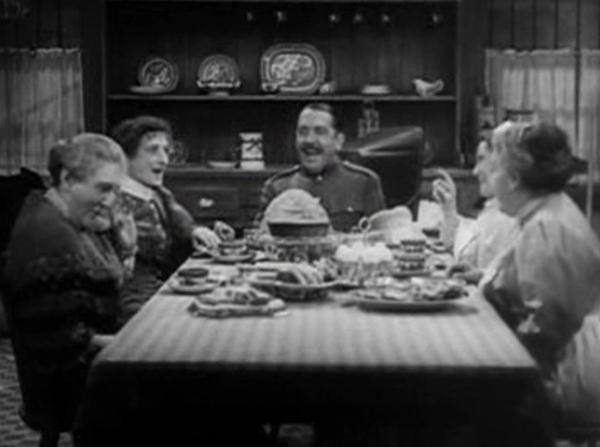
Yes, having a hard time separating Cavalcade from Upstairs, Downstairs. Herbert Mundin, not Gordon Jackson, at the head of the table.
Joe Marryot approaches manhood as Europe approaches total war. Even Brook, as his father, shows a bit of emotion when Joe hopes that the war lasts long enough for him to see a bit of the fighting. He needn’t worry.
Before pushing off to the front Joe has a night out at a club with a couple of chums and is immediately enchanted by one of the performers. When he asks who the dancing girl is he is told that it’s Fanny Bridges: Bonita Granville has grown up and the part is now played by Ursula Jeans!
Lawton and Jeans share the most blatantly sexy pre-Code moment of Cavalcade when Joe waits to surprise Fanny in her dressing room, but Fanny begins undressing before he can announce himself. Joe hides behind her door, blushing and getting a lump in his throat, yet not taking his eyes off of Fanny as she strips down to her underthings, presumably in the privacy of her dressing room.
After the awkward moment of their introduction passes and Joe makes clear who he is and how she knows him, an air raid siren interrupts. They go to the roof together and watch as an invading German Zeppelin is shot down. “Isn’t it thrilling,” Fanny says, cuddling up to Joe. They remain an item throughout the war.
Ursula Jeans
 The actress who plays Fanny Bridges was born Ursula Jean McMinn to British parents in Simla, British India in 1906. She was raised in London, the youngest of three acting siblings including brother Desmond Jeans, who also boxed, and sister Isabel Jeans.
The actress who plays Fanny Bridges was born Ursula Jean McMinn to British parents in Simla, British India in 1906. She was raised in London, the youngest of three acting siblings including brother Desmond Jeans, who also boxed, and sister Isabel Jeans.
Ursula Jeans made her stage debut in London in 1922. She was spotted by Ivor Novello while touring with Owen Nares and Novello quickly brought Ursula to fame by casting her in the leading role of Firebrand. Unfortunately Firebrand flopped and Jeans went back to obscurity taking smaller parts and learning her trade. She became a sensation in London playing the part of Flaemmchen in Grand Hotel (the Joan Crawford part in the movie) and by 1933, just prior to Cavalcade, newspapers were calling her the darling of Broadway for her lead in Late One Evening.
After Cavalcade her best known film roles would be Storm in a Teacup (1937) and as a supporting player in the classic Archers production The Life and Death of Colonel Blimp, which starred Ursula’s second husband, Roger Livesey. Jeans and Livesy often appeared together on stage after that and remained married from 1937 until Ursula Jeans died of cancer in 1973, age 66.
Cavalcade: To the Present
The focus of Cavalcade remains squarely on its characters in this changing world. While history unfolds around them we only see it through their eyes. An adult audience in 1933 could easily fill in the details around their own recent history and use them to interpret and enhance their experience viewing Cavalcade.
Two wars occur but the only battles come through a horrific montage of soldiers marching and dying as the years of the World War literally pass by one by one across the screen and our characters simply age four years when the next scene, just prior to Armistice, begins.
The Jazz Age is introduced as a blonde (supposedly Betty Grable) falls into the arms of her lover at a wild party which also offers quick glimpses of a lesbian come on and an equally brief exchange between two gay men. At the same club the jazz baby of the hour, Fanny Bridges, enters to sing Noel Coward’s “Twentieth Century Blues” in a sad and sexy performance meant to make us think twice before enjoying ourselves all that much.
Back at the Marryots, progressive Margaret comments that she likes Jazz and surprises Jane by talking of being in Paris on Monday and back in London on Tuesday thanks to the modern miracle of air flight.
“One more year behind us,” Robert Marryot says to his wife that New Year’s Eve.
“One more year before us,” Jane replies. “Everything passes, even time.”
Cavalcade comes to an end as the Marryots toast “dignity, greatness and peace.”
Winner of three Academy Awards, for Best Picture, Best Director (Frank Lloyd) and Best Art Direction (William S. Darling), Cavalcade establishes a template for the nostalgia pieces that follow it to this day. While it somehow does nothing more than mention Edward VII, darling of Cavalcade’s 1960s and ‘70s descendants, it does capture the transition from the tail end of Victorian times through the horrors of war and beyond. It portrays the time between the end of the War and its own release as frivolous and full of empty promises rather than progressive and fun before closing with hopes of optimism going forward.
Cavalcade is an oddly overlooked Oscar winner considering how influential it did became.
 Cavalcade was released on VHS by 20th Century Fox in 1998 and prior to its coming video release this August 6, in a Blu-ray/DVD combo pack
Cavalcade was released on VHS by 20th Century Fox in 1998 and prior to its coming video release this August 6, in a Blu-ray/DVD combo pack, had only been available on DVD in Fox’s massive 75th Anniversary Collection from 2010. That set is as pricey as you might expect
a 76-disc collection to be.
As a Fox release it also misses out on gaining a modern audience through Turner Classic Movies, though Cavalcade does make occasional appearances on the Fox Movie Channel and, I believe, has aired on TCM in the past. My recording and the screen captures that accompany this post originated from a previous airing by Fox Movie Channel.
For another look at Cavalcade please see Danny’s review at Pre-Code.com. Warning: I don’t think I’ve ever seen Danny dislike a movie this much!
Sources
- ”A New Comedian: Mr. Herbert Mundin.” Sydney Morning Herald 30 Mar 1929: 15. Web. Google News. 15 Jul 2013.
- Day, Barry. Coward on Film: The Cinema of Noel Coward Lanham, MD: Scarecrow Press, 2005.
- ”Diana Wynyard: Retirement from Films. Syndey Morning Herald 23 Aug 1935: 12. Web. Google News 15 Jul 2013.
- ”Herbert Mundin Fatally Injured in Auto Accident.” Meriden Daily Journal 6 Mar 1939: 2. Web. Google News 15 Jul 2013.
- ”Minute Biographies: Ursula Jeans.” Pittsburgh Post-Gazette 24 Jan 1933: 13. Web. Google News 15 Jul 2013.
[phpbaysidebar title=”Cavalcade Stars on eBay” keywords=”Clive Brook,Diana Wynyard,Herbert Mundin,Frank Lawton” category=”45100″ num=”5″ siteid=”1″ sort=”EndTimeSoonest” minprice=”39″ maxprice=”599″ id=”2″]




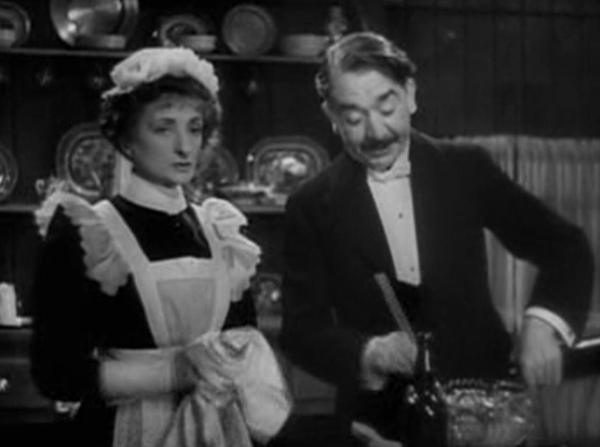





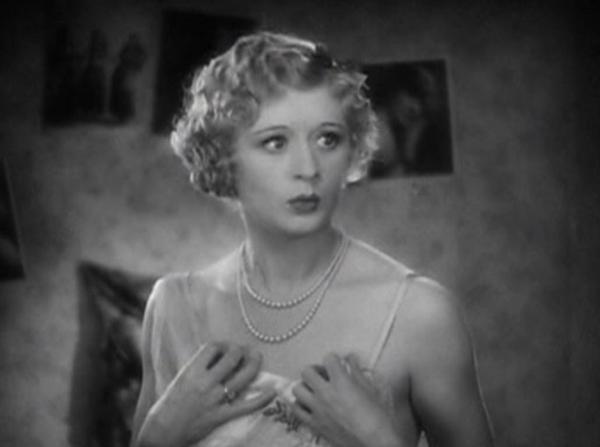
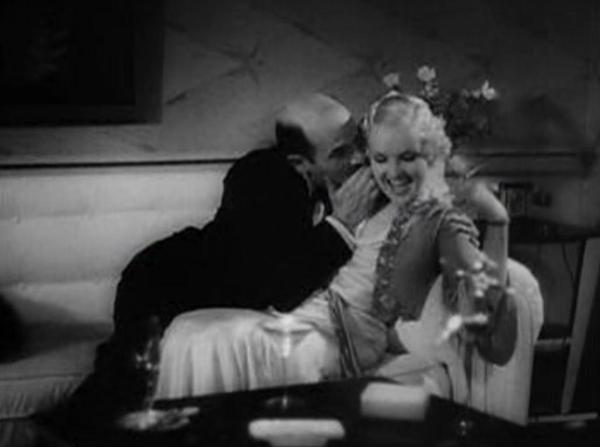

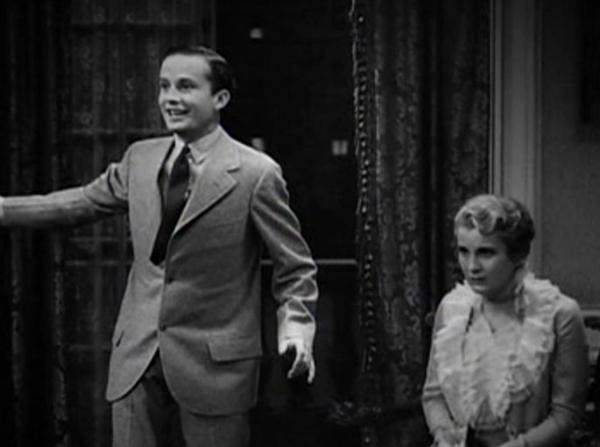

I enjoy “Cavalcade” more as a mature person than I did when I first saw it as a teen. I found the pace to be oddly slow for such a vignette-filled film and felt a certain detachment from the characters. However, the make-up and costumes were top-notch, as were the thrilling crowd scenes. I was particularly impressed with the montages, especially for WWI which was extremely effective and quite moving.
I first saw Cavalcade before I watched any of the later British period series–didn’t care for it then myself. It improved for me only after having immersed myself in all of those shows and mini-series that followed. Yeah, I didn’t find any of the Cavalcade characters very well developed. It was as though they had too much time, yet not enough time all at once.
I have now seen CAVALCADE twice-once at an Academy screening some years ago (one in which, while I was walking through the lobby I saw my good friend Ron Haver just ahead of me; I asked him if he had ever seen the film and he nodded yes and quickly gave a thumbs down and a “razzberry”) and I have to admit that, while I loved the epic scale of the movie and the period in history that it covered I thought it was a total bore and I thought that Diana Wynard was one of the most boring, mannered actresses I had ever seen (I am more convinced than ever about this-see MEN MUST FIGHT and ONE MORE RIVER for proof if you don’t believe me after watching CAVALCADE)
At that same Academy screening the audience gave a big “whoooooo!” when the Titanic reveal happened-I remember turning to the friend I was with when I saw that we had a young honeymooning British couple/on a ship/pre-WWI and said “Titanic.’ He smiled at that moment then laughed when the reveal happened. He later asked me how I knew (I only knew the basic plot through what I had read in a few movie books and no real details) and I said that knowing the time period and that both the sinking and WWI were nexis points in British history I told him I automatically assumed it.
CAVALCADE I think can be seen as a precursor to “Upstairs/Downstairs” and “Downton Abbey” as well as GOSFORD PARK, but where the two series and sections of the Altman film improve on the Lloyd film is not having the stage origins so blatant-the film is cinematic but there are long sections where the characters just talk and talk ad nauseum and the musical numbers (WAY too many of them), which obviously were in the original play for transitions of scenery and costume changes, make the film seem a lot longer than it really is.
Aside from Will Rogers’ films and the early vehicles for Shirley Temple, CAVALCADE was the last box office smash for the faltering Fox Film company before Zanuck took it over when his 20th Century company merged with it two years later, and it, along with THE GREAT ZIEGFELD and CRASH, constitutes the worst Best Picture Oscar winner list.
Thanks for this well thought, detail packed comment!
I think the Titanic scene was supposed to be obvious because it led with the date. I don’t know how good the audiences’ history would have been then, but it was only a little over 20 years later so I’d imagine they’d have gotten it even quicker than us. Because of that I don’t think the reveal is surprising as much as it is suspenseful. You’re kind of left hoping that they’re not on that ship and so the little gasp once it’s confirmed that they are.
I don’t know, Upstairs, Downstairs is pretty stage-bound itself, it’s just the that the dialogue is stronger and the characters and situations are developed over several episodes annd seasons for us. Agree on Downton and Gosford Park, though I don’t enjoy those as much as I do the addictive run of U/D.
I watched Cavalcade twice more this past week preparing for this post and, honestly, I didn’t find any of the musical numbers too out of place. Even now I can only recall three or four and a couple of those seemed to fit naturally, while I enjoyed the final number (“Twentieth Century Blues”) enough not to care too much. After admittedly dragging a bit of the way though Cavalcade seemed to rush to its ending making that tune seem, appropriately, a bit frenzied.
Wouldn’t it have worked better had they narrowed their historical scope and expanded on the characters some? I think the structure and success of some of the later series bears this out, though they are able to actually widen their historical scope and still give us great characters because they didn’t have the time constraints. But nobody knew that could ever happen back in ’33.
Wynyard is terrible in Men Must Fight, though I thought she had a bit more color in One More River. She mopes about most of Gaslight by design, but manages to light up and actually make herself chilling in the finale. Overall, I agree with your assessment though, she doesn’t do much for me.
I’ve disliked other movies before, but none were this long! I usually enjoy the class examination films that the British produce, but this one is such a snorer. It’s a lot of dialogue with nothing interesting about it. I think we both agree that Diana Wynyard had a couple of good moments, but outside of that this one is a dirge. Good on you for writing something so wonderfully comprehensive about it, though.
Yeah, you hated one with Stanny recently too, if I remember correctly!
I think my main defense of Cavalcade rides on the idea that it’s an “old” movie that could win over current fans of Downton Abbey. And I wouldn’t be surprised if that’s why the DVD didn’t come until now.
Love you article. Very well written and informative. You examine the ins-and-outs of the film quite well. That being said, I can’t agree that it’s very good. (My review is here for anyone who cares: http://theartisticpackrat.wordpress.com/2013/04/12/and-the-oscar-goes-to-cavalcade/#more-734) I couldn’t get into the characters, the tone of the film is mostly too cheesy, and the film jumps around way too much in character POV, which I think is why I couldn’t care much about the characters.
I will say the WWI montage is great and the last montage with…whats-her-name singing over a slew of images showing how the terrible 20th century.
I don’t know if liking Downton Abbey is a guarantee for liking it. My fiancee watched Cavalcade with me and she disliked it as much as I did.
Thanks! Oh, I don’t think liking Downton is a guarantee for liking it, so much as I think a major part of that program is spun out of the same dynamic of contrasting the two classes from within the same home. There’s a direct lineage, but yup, character development on the scale of Downton or Upstairs, Downstairs (even better) isn’t (can’t be?) reached in the 110 minutes of Cavalcade.
A bullet point from my post above: “The weakness of Cavalcade … is that there is too much history spread over too many characters for us to ever get a chance to care much about any of them.”
Seems to be the general consensus.
They probably could have come out of this better by just sticking with the first generation of characters, but then again, I assume that the final product likely resembles the structure of the smash Noel Coward play.
Still, I have a hunch that if 1933 could have a do-over, Cavalcade would still reap the praise. The fact that we’re still fascinated by this same period of history brought to life through the same types of characters points to how impressive it must have been the first time out.
Oh, yeah, it definitely inspired the like of Downton Abbey. No doubt about that. Sorry for the confusion. It is also a very good concept/theme for a movie. Discussing how different the 20th century is from the 19th is a great thing to talk about and one I’ve never seen in a film before.
Hey Tim,
Just spotted your reply to my reply. Not much more to add except that after watching so many of the more recent series like those we’ve discussed (recent being, oh the last 40-45 odd years!), I find it fascinating that Cavalcade looks at this period from so close in time.
Thanks again, Cliff
I’ve just seen this film and really liked it, though I was left feeling that it could have been a whole TV series. Enjoyed your comprehensive take on this a lot, Cliff. ‘Twentieth Century Blues’ is fantastic – I’ve just listened to Coward himself singing it and he really does it in a bluesy style too.
So glad you enjoyed both the movie and my post, Judy! I’ll be watching this one again sometime soon myself — I’m in the middle of watching Upstairs, Downstairs again right now (just began Season 3) and I always circle back around to Cavalcade once I finish up a run of that.
I noticed the immediate similarities between “CAVALCADE” and “UPSTAIRS, DOWNSTAIRS”. Although being a fan of the television series, I found it difficult to like “CAVALCADE”. Well . . . I didn’t like it, to be honest. I found it pretentious, episodic, boring and a little too conservative in its outlook on society.